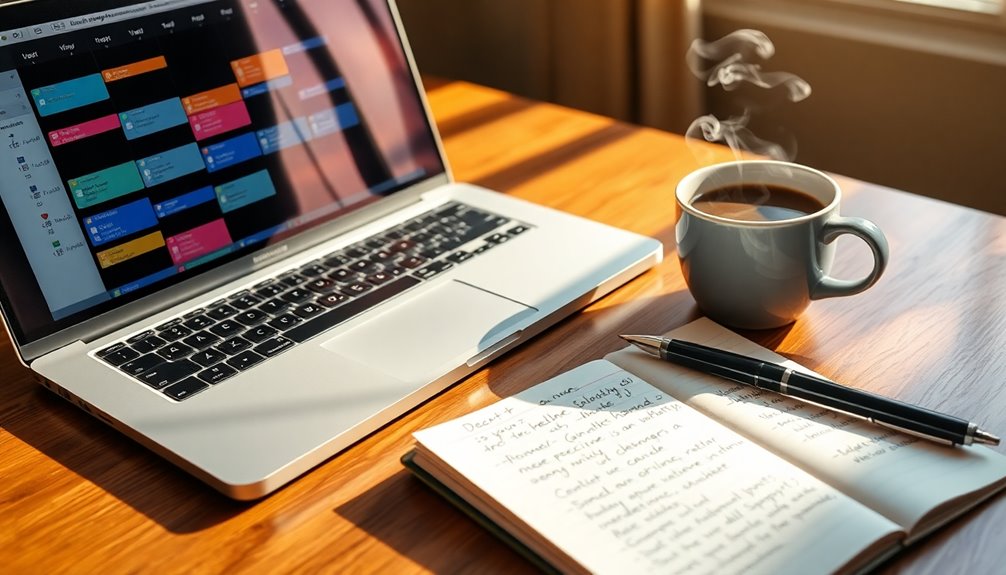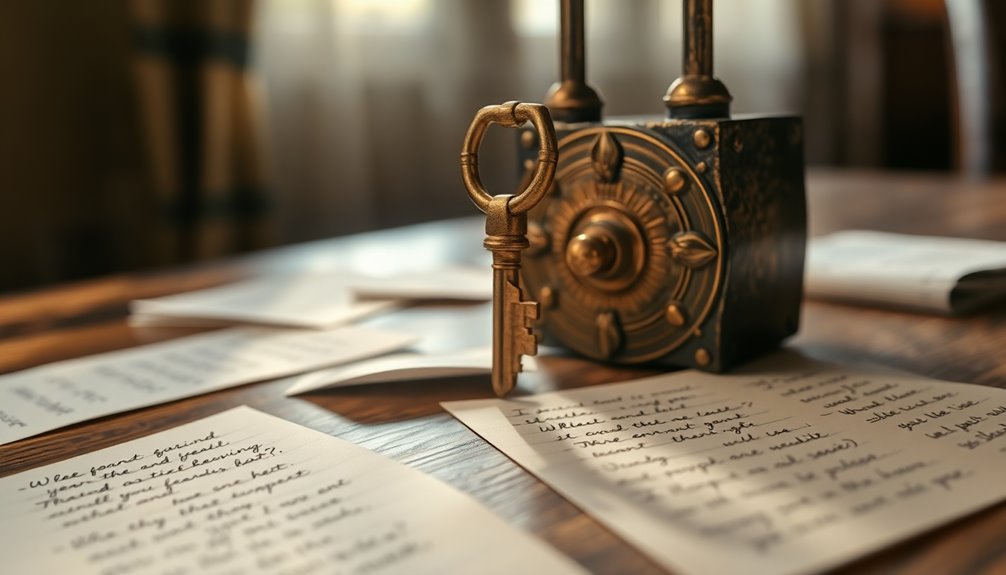Mastering your follow-up after interviews is essential for making a lasting impression. Start by sending a sincere thank-you email within 24 hours, mentioning the specific role and expressing gratitude for the interviewer's time. Highlight your relevant experiences and address any concerns discussed during the interview. If you don't hear back in two weeks, a gentle reminder can show continued interest. Keep your message concise and focused, and limit follow-ups to one or two to avoid overwhelming the hiring manager. Want to reveal more strategies to enhance your follow-up approach? There's plenty more to explore on this topic.
Key Takeaways
- Send a thank-you email within 24 hours to express gratitude and reinforce interest in the position.
- Highlight relevant experiences and qualifications that align with the role in your follow-up message.
- Address any concerns or needs discussed during the interview to demonstrate thoughtfulness and engagement.
- Include a clear call to action, asking about next steps or timelines for the hiring decision.
- Monitor signs of interest from the interviewer, such as inquiries about availability or positive body language.
Understanding Follow-Up Emails
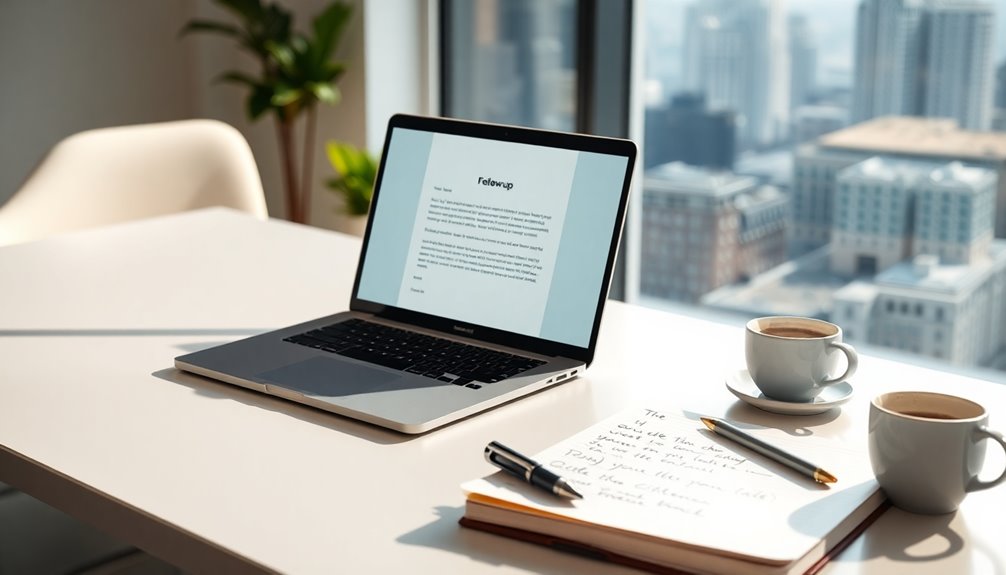
When you wrap up an interview, sending a follow-up email can make a significant difference in your job search. This email, typically sent the day after your interview, serves multiple purposes.
First, it expresses gratitude for the interviewer's time and consideration. A well-timed follow-up reinforces your interest in the position and keeps communication channels open.
If you haven't heard back in two weeks, a second follow-up can demonstrate your enthusiasm and inquire about the hiring process's status. Your follow-up is also an opportunity to remind the hiring manager of your qualifications, reinforcing your fit for the role.
Key Components of Follow-Up Messages
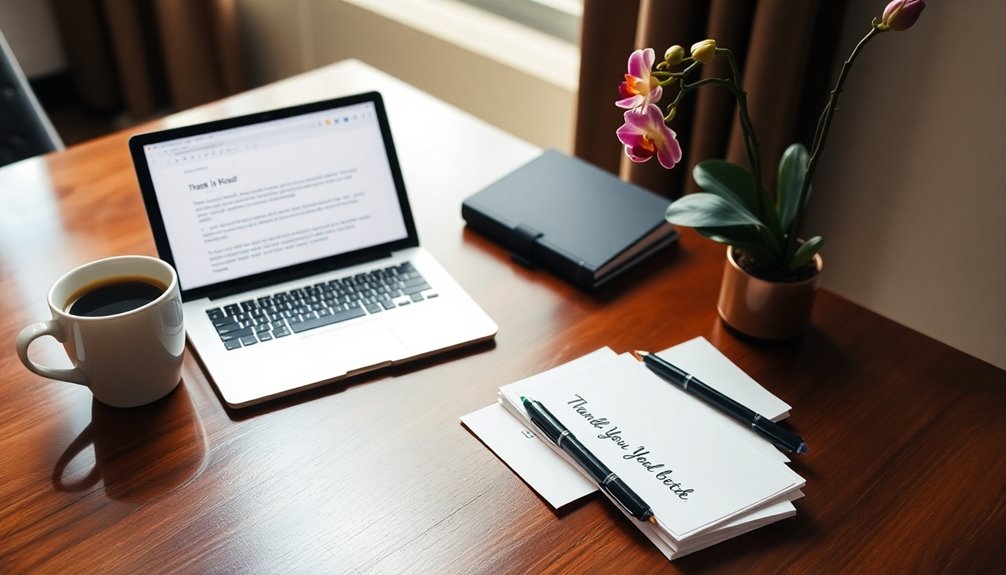
A well-crafted follow-up message can greatly enhance your candidacy, and understanding its key components is essential.
Start with a sincere thank you for the interview opportunity, mentioning the specific role you discussed. Highlight your relevant experiences and qualifications, and consider including a personal achievement that reinforces your fit for the position.
Address any business needs or concerns raised during the interview to show your attentiveness. Conclude with a clear call to action regarding next steps, encouraging ongoing communication.
Structure your email with a concise subject line, a polite greeting, and a succinct purpose statement. Remember, keeping your message focused and clear will help you maintain a positive impression with the hiring manager. Additionally, staying emotionally resilient during this process can greatly influence your overall success.
Tips for Crafting Effective Emails
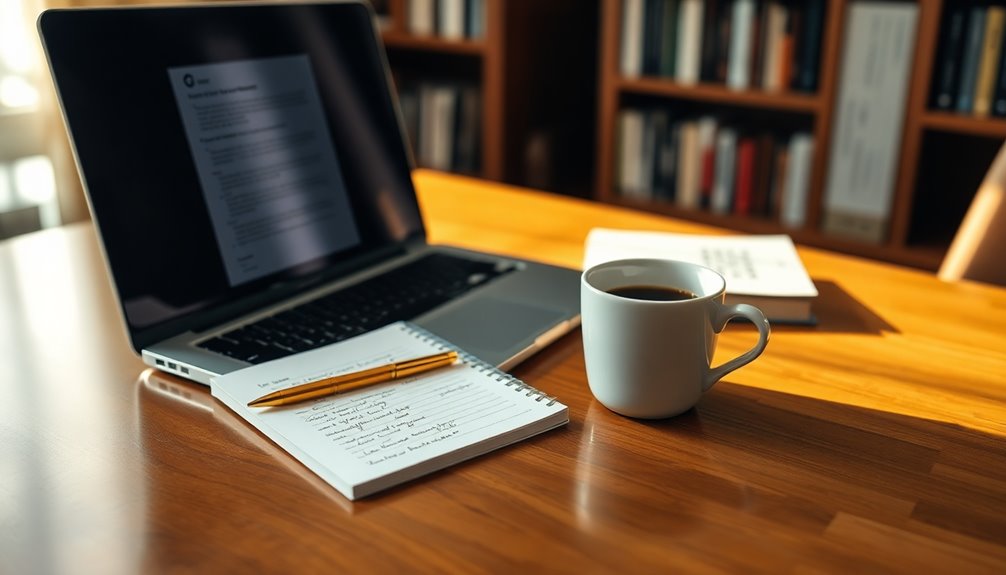
Crafting an effective follow-up email can greatly influence your chances of landing the job. Start by being specific and concise; remind the interviewer of key discussion points without overwhelming them.
Highlight your unique qualifications that directly address any needs mentioned during the interview, positioning yourself as a solution. Use a conversational tone to foster engagement, making the email feel personal yet professional.
Always proofread for grammatical errors and clarity, as attention to detail is essential. Aim for a clear subject line and a polite greeting, followed by a succinct statement of purpose and a strong closing with your contact information. Additionally, demonstrating your strong communication skills can further reinforce your fit for the role.
These tips can help your follow-up email stand out and reinforce your interest in the position.
Timing Your Follow-Up Appropriately
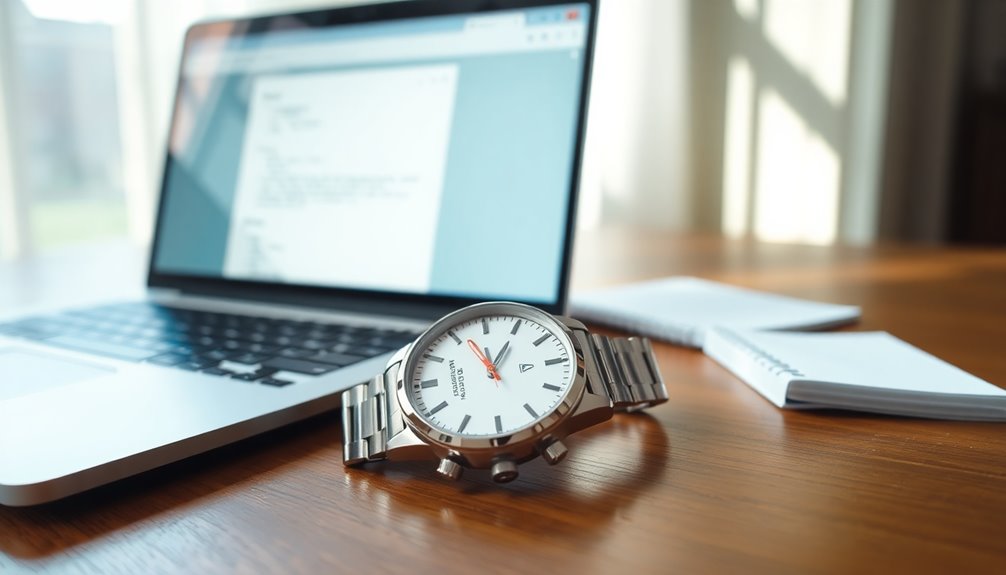
Timing your follow-up is essential in the job search process. You want to strike the right balance between showing interest and not appearing overly enthusiastic.
Here are some key timing tips to keep in mind:
- Send your thank-you email within 24 hours of the interview.
- If you haven't heard back, consider a second follow-up after two weeks.
- Keep track of the timeline the interviewer mentioned regarding the decision-making process.
- Avoid sending multiple follow-ups; one or two is plenty.
- Stay engaged with other opportunities while you wait for a response.
Recognizing Signs of Interest
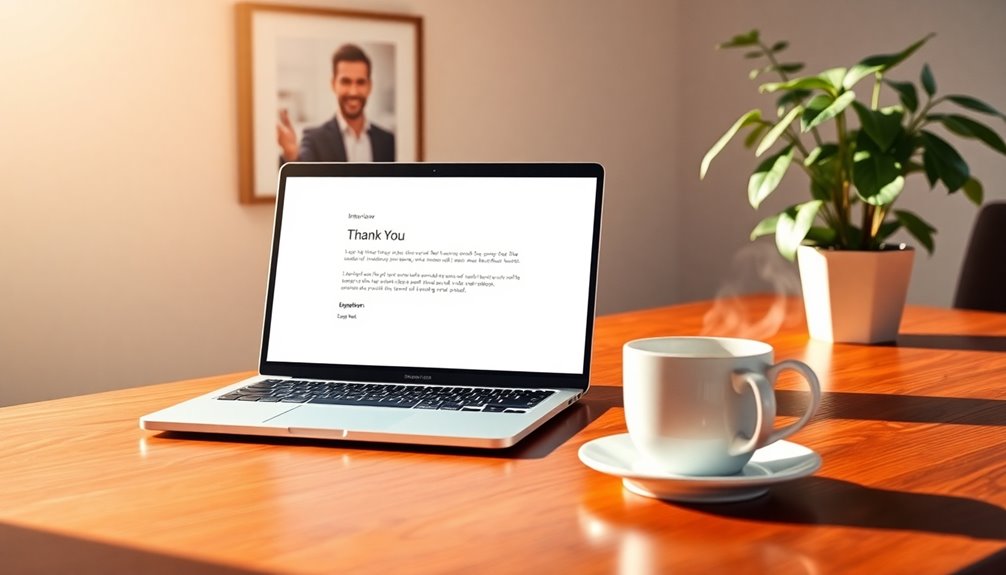
Recognizing subtle signs of interest from interviewers can greatly impact your follow-up strategy. Pay attention to the questions they ask about your availability or start dates; these often indicate genuine interest.
If the interviewer discusses next steps or shares details about team dynamics, it's a positive sign. Notice their body language—leaning in, maintaining eye contact, and nodding can all suggest engagement.
Additionally, if they share personal anecdotes or express excitement about the role, you're likely on their radar. Keep these cues in mind as they can guide your follow-up timing and content, helping you reinforce your fit for the position.
This awareness can make your communication more effective and tailored to their interest level.
Interpreting Interview Feedback
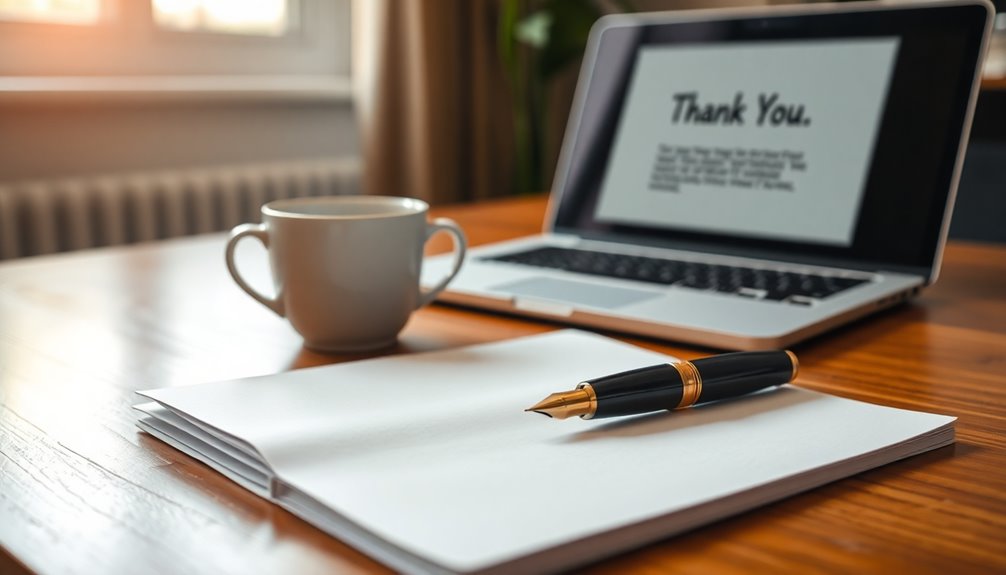
Observing the signs of interest during an interview can set the stage for understanding feedback more clearly.
Take note of the interviewer's words and body language to gauge their perception of you as a candidate. Positive feedback often comes in subtle forms, so look for these clues:
- Specific praise about your qualifications or experience.
- Questions about your availability for the role.
- Discussions of potential next steps in the hiring process.
- Personal anecdotes shared that indicate rapport.
- Positive body language, like nodding or leaning in.
Managing Follow-Up Frequency

Consistently managing your follow-up frequency is essential to maintaining a professional image after an interview. Start with a thank-you email within 24 hours to express gratitude and reinforce your interest.
If you haven't heard back after two weeks, a gentle second follow-up can show your enthusiasm without appearing desperate. Limit your follow-ups to these two instances to avoid overwhelming the hiring manager.
If you still receive no response, shift your focus to other opportunities while keeping the door open for future communication.
Pay attention to any signs of interest during the interview, like inquiries about your availability, as these can guide your follow-up strategy and help gauge the hiring manager's engagement.
Additional Resources for Candidates
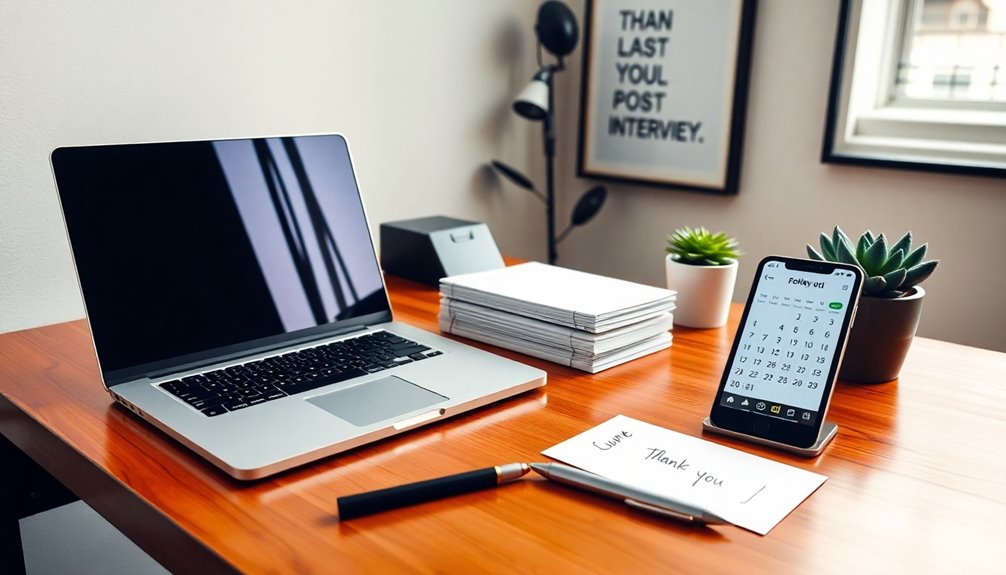
After managing your follow-up frequency, it's helpful to explore additional resources that can support you in your job search.
These tools can enhance your understanding of the hiring landscape and refine your approach. Here are some valuable resources to examine:
- Interview preparation guides: Gain insights into common questions and effective responses.
- Resume templates: Find layouts that highlight your strengths and achievements.
- Networking platforms: Connect with industry professionals and expand your contacts.
- Career coaching services: Receive personalized advice and strategies tailored to your goals.
- Online courses: Improve specific skills relevant to your desired position.
Utilizing these resources can empower you, making your job search more efficient and successful. Additionally, understanding different IRA investment strategies can provide you with insights into financial planning that may be beneficial in your career journey.
Frequently Asked Questions
How Can I Personalize My Follow-Up Email Effectively?
To personalize your follow-up email effectively, start by expressing genuine gratitude for the interview opportunity.
Reference specific topics you discussed, highlighting your relevant experiences.
Include a personal touch, like a shared interest or insight that emerged during the interview.
Address any concerns the interviewer mentioned, showing you're attentive to their needs.
Finally, conclude with a friendly nudge about the next steps, reinforcing your enthusiasm for the position and the company.
What Should I Do if I Don't Receive a Response?
If you don't receive a response after your follow-up email, wait about two weeks before sending a polite second follow-up.
In your message, express continued interest in the position and ask for any updates regarding the hiring process. Keep it concise and friendly; don't overwhelm them with multiple messages.
Meanwhile, consider exploring other opportunities to maintain momentum in your job search while waiting for their reply.
Can I Follow up Multiple Times After an Interview?
You can follow up after an interview, but it's important to limit how often you do it. One follow-up email within 24 hours is ideal to express gratitude and reiterate your interest.
If you haven't heard back after two weeks, a second follow-up can be appropriate. Avoid multiple follow-ups in a short time, as it might come off as impatient.
Focus on other opportunities while keeping this position in mind.
Is It Appropriate to Mention Salary in My Follow-Up?
It's important to gauge the timing and context when considering mentioning salary in your follow-up. If the interviewer hasn't brought it up, hold off on initiating that conversation.
Instead, focus on expressing gratitude and reaffirming your interest in the role. Once you've established a rapport, you can address salary during later discussions.
How Do I Address Multiple Interviewers in My Email?
When addressing multiple interviewers in your follow-up email, start with a personalized greeting for each person.
Use their names, and consider listing them in the order they interviewed you.
Thank each one for their time and reference specific points discussed with them to show your attentiveness.
Keep your message concise and focused on reinforcing your interest in the role, making sure to maintain a professional and friendly tone throughout.
Conclusion
Ultimately, mastering your follow-up after interviews can be the difference between landing your dream job and fading into the background. A well-crafted email shows you're not just another candidate; you're a standout who genuinely cares. By expressing gratitude, reinforcing your interest, and showcasing your qualifications, you keep your name at the forefront of the hiring manager's mind. So, don't underestimate the power of a great follow-up—it could be your golden ticket to success!
